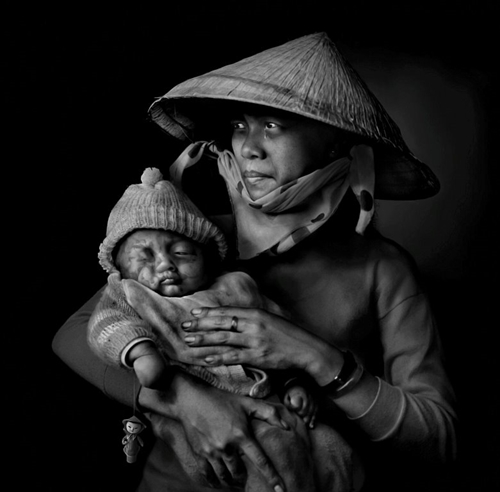Over the past time, in the spirit of “forgetting the past, looking to the future,” Vietnam and the U.S. have taken various effective and practical measures to heal the wounds of war. However, experts have evaluated that those efforts are not enough as around 3 million Vietnamese people are still being affected by AO/dioxin, and next generations of the Vietnamese people are being affected by the consequences of the disaster.
In recent article posted on usip.org, Dr. Andrew Wells-Dang, who leads the Vietnam War Legacies and Reconciliation Initiative at United States Institute of Peace (USIP), evaluated that AO and other toxic chemicals that the U.S. sprayed over Southern Vietnam have left long-term and severe consequences on the Vietnamese people.
    |
 |
|
A child who is an AO/dioxin victim (Photo: hpdf.vn) |
From 1961 to 1971, the U.S. troops sprayed 80 million liters of AO, which contained about 400 kg of dioxin, over more than 3 million hectares of forest in South Vietnam. More than 4,8 million people were directly exposed to toxic chemicals, of which more than 3 million people have been suffering from dangerous diseases, especially cancers and malformations.
Vietnam has about 75,000 second-generation victims of AO/dioxin and 35,000 others of third generation. According to some recent findings, some localities even have victims in the fourth generation. From the above fact, Dr. Andrew Wells-Dang said that the U.S. government has moral and historical responsibility in dealing with the consequences of AO in both Vietnam and the U.S.
Sharing the same view, Phan Xuan Dung, a research officer at the Institute of Southeast Asian Studies – Yusof Ishak Institute in Singapore, said that addressing the lingering effects of AO is an important aspect of this strengthened bilateral relationship as it facilitates “trust building and healing” between the U.S. and Vietnam.
In recent decades, the U.S.-Vietnamese relationship has developed. “If the U.S. wants a strong strategic partnership with Vietnam, it is important that the U.S. shows a strong commitment to addressing war legacies in an earnest manner,” he added.
It is worth noting that, although the U.S. has coordinated with Vietnam in projects on dioxin contamination remediation in some hot spots, the U.S. government has not taken formal responsibility for the use of AO and declared to compensate the Vietnamese AO victims.
In recent speeches, U.S. officials affirmed the priorities to deal with the issue. However, the compensation has not been conducted.
On the one hand, the U.S. government has stated that no scientific evidence links AO/dioxin to adverse health effects found in Vietnam and refused to compensate Vietnamese victims. One the other hand, the government has listed U.S. veterans’ diseases related to AO/ dioxin and compensated hundreds of million USD for war veterans. The fact shows that the U.S. has been imposing a "double standard" to ensure its maximum interests, but ignore the interests of other countries.
Mr. Dung said that treating all victims equally is just a moral thing to do. He added that if both countries can do this, it will be a big step toward a mutual understanding and trust, which provides a springboard for more profound relationship in the years to come.
Translated by Chung Anh